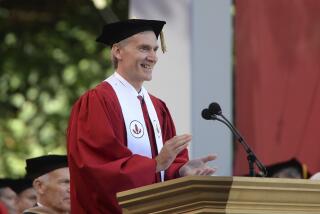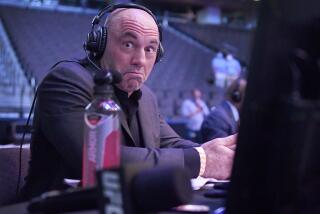Ethics in Science
- Share via
Your Nov. 21 editorial, “Ethical Tremors in World of Science,” reveals the moral dilemma that scientists, along with everybody else, find themselves in: an American Dream in which the norms are that competition rules over cooperation and personal success is more highly prized than the common good. The argument that the ultimate reward in science should come from finding the truth in an ethical scientific world, while at the same time recognizing, expecting and thus institutionalizing cheating and thievery in business, has a weary cynicism about it.
To compound the problem, scientific truth, regardless of where it leads, is supposed to be amoral, free from the investigator’s beliefs or biases. This was neatly expressed some years ago by the science administrator of a federal agency responsible for scores of millions of dollars worth of research into weather modification. When asked, “Look. What if it works?” he responded, rather slowly (he is also a very good scientist), “Well, I can see a problem. Someday, there is a hurricane roaring up the Gulf and the governor of Louisiana is on the telephone calling Washington, ‘For God’s sake, turn it off!’ and the governor of Texas is on another line with, ‘Let it go, let it go.’ But that’s not our problem. Our problem is to see if we can do it.” I did not agree.
The Times’ advice to the new Commission on Research Integrity will become more credible when it is linked to American cultural and ethical norms and legal standards for the life of the whole community. There is no persuasive evidence that double standards are either efficient or equitable in business, ethics, governance, law, media, politics, religion, science, or any other works. Still, some people have to take lead roles in cleaning up and rationalizing the American act. I argue that they should include scientists who ask the higher-order question, “What if it works?”
CHARLES G. GUNNERSON
Laguna Hills
* Your editorial writer may be a mite too glib in selecting examples of scientific fraud. In the case of the University of Utah scientists (Stanley Pons and Martin Fleischmann) the problems of their claim of “cold fusion” arose from apparent over-interpretation of data and insufficiently sensitive control measurements. No evidence of “gross fraud” was advanced. Indeed the thermodynamics of the electrochemical incorporation of deuterium (“heavy hydrogen”) into the metallic crystal structure of palladium is still under investigation in reputable laboratories in both this country and elsewhere.
ALAN G. FINCHAM Ph.D.
CCMB Laboratory
University of Southern California






